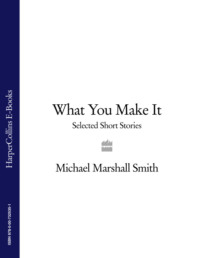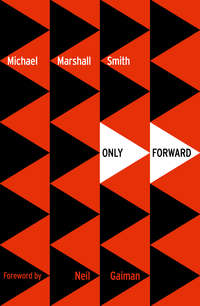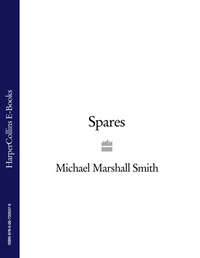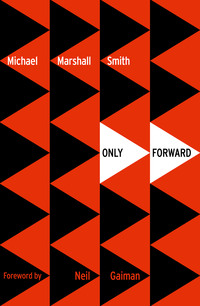
Полная версия
One of Us

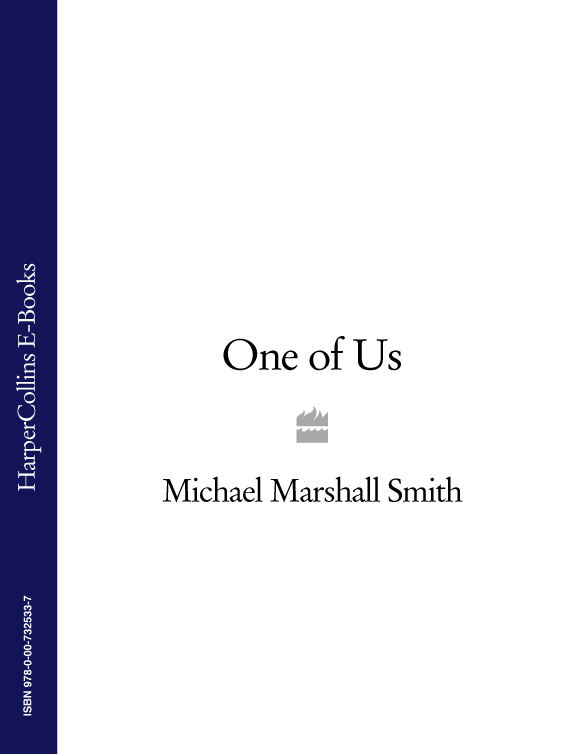
Michael Marshall Smith
One Of Us

For Tracey,
sister, friend
and for those who have become invisible:
Sue, Peggie, Betty, Clarice and Mabel
The invisible is the secret face of the visible. M. Merleau-Ponty
Table of Contents
Epigraph
Prologue
Part One - REMtemp
Chapter One
Chapter Two
Chapter Three
Chapter Four
Chapter Five
Chapter Six
Chapter Seven
Chapter Eight
Part Two - Missing
Chapter Nine
Chapter Ten
Chapter Eleven
Chapter Twelve
Chapter Thirteen
Chapter Fourteen
Chapter Fifteen
Part Three - Becoming Visible
Chapter Sixteen
Chapter Seventeen
Chapter Eighteen
Chapter Nineteen
Chapter Twenty
Chapter Twenty-one
Thanks to …
About the Author
By Michael Marshall Smith
Copyright
About the Publisher
Prologue
Night. A crossroads, somewhere in deadzone LA. I don't know the area, but it's nowhere you want to be. Just two roads, wide and flat, stretching out four ways into the world: uphill struggles to places that aren't any better, via places which are probably worse.
Dead buildings squat in mist at each corner, full of sleep and quietness. It seems like they lean over above us like some evil cartoon village, but that can't be right. Two-storey concrete can't loom. It's not in its nature. The city feels like a grid of emptiness, as if the structures we have introduced to it are dwarfed by the spaces which remain untouched, as if what is not there is far more real than what we see.
A dog shivers out the end of its life meanwhile, huddled in the doorway of a twenty-four-hour liquor store. The light inside is so yellow it looks like the old guy asleep behind the counter is floating in formaldehyde. When she was younger, the woman would have done something to help the dog. Now she finds herself unable to care. The emotion's too old, buried too deep – and the dog's going to die anyway.
I don't know how long we wait, standing in the shadowed doorway, hiding deep in her expensive coat. She gets through half a pack of Kims, but she's smoking fast and not wearing a watch. It feels like an eternity, as if this corner in the wasteland is all I've known or ever will see; as if time has stopped and sees no compelling reason to start flowing again.
Eventually the sound of a car peels off from the backdrop of distant noise and enters this little world. She looks, and sees a sweep of headlights up the street, hears the rustle of tyre on blacktop, the hum of an engine happy with its job. Her heart beats a little more slowly as we watch the car approach, her mind cold and dense. It isn't even hatred she feels, not tonight or any more. When the cancer of misery has a greater mass than the body it inhabits, it's the tumour's voice you hear all the time. She's stopped fighting it now. All she wants is some peace.
The car pulls up thirty yards along the street, alongside an address she spent two months tracking down, and ended up paying a hacker to find. The engine dies, and for the first time she glimpses the man's face through the dirty windshield. Shadowed features, oblivious in their own world of turning things off and unfastening the seatbelt. Seeing him isn't climactic, and comes with no roll of drums. It just makes us feel tired and old.
He takes an age to get out of the car, leaning across to gather a pack of cigarettes from off the dash. I don't know for sure that's what he's doing, but that's what she decides. It seems to be important to her, and what she feels about this man is far too complex for me to interpret. She is calm, mind whirling in circles so small you can't really see them at all, but her heart is beating a little faster now, and as he finally opens the door and gets out of the car, we start to walk towards him.
He doesn't notice, at first, still fumbling with his keys. She stops a few yards from the car, and he looks up blearily. Drunk, perhaps – though she doesn't think so. He was always too much in control. Probably just tired, and letting it show while there's no-one around to see. He's older, greyer than she was expecting, but with the same slightly hooded eyes. He looks early fifties, trim, a little sad. He doesn't recognize her, but smiles anyway. It's a good smile, and may once have been quite something, but it doesn't reach the eyes any more.
It's about now that the other car first appears, way off down the other road. I didn't notice it the first time, and she never does. She just stares at him, waiting. A generic smile isn't enough. We want him to know who we are. The bond operates in two directions. She cannot break it alone.
‘Help you?’ he asks eventually, peering at her. He stands by the car, back straight. He's not frightened, sees no need to be, but he's beginning to sense this is not a run-of-the-mill encounter. All he sees is a skinny woman in a good coat, a confidence too often used as something to hide behind. But there's something about us which disturbs him, reminds him of someone he used to be.
‘Hello Ray,’ she says, and then nothing else, waiting for him to remember.
Maybe it's something in her face that does it, puts him in mind of a grin long ago. His eyes open wider and some measure of confidence returns, his face relaxing a little. A picture of reliability. They look at each other for a while, but by now my attention is on the sound of the car. I know it's coming, big and silver and fast.
‘It's Laura, isn't it?’ Ray asks eventually. Her name is still there, near the front of his mind. Maybe it always has been, the way his has been in hers. He nods. ‘Yes, it's you.’ He gives a short, bewildered laugh, sticking a cigarette in his mouth. ‘I never forget a face.’ His left eyelid droops slowly, a little uncertainly. He clicks the wheel of his lighter and starts bringing it up to his face.
The wink is like returning to a childhood playground, and finding a swing still rocking as if you had only just this moment climbed down. It's enough.
The first shot goes straight through his left eye, blatting a baseball of shit out of the back of his skull. He's still trying to back away as the next bullet tears through his groin, and as another splashes through most of his throat. But then he's on the ground, legs spastically twitching, as we step forward to stand over him.
The dog watches it all, from its patch by the wall, but it's got problems of its own and Ray's going to die anyway.
She doesn't stop firing until the gun is empty. The body is still by then, and has nothing worth speaking of above the neck. The cigarette alone is almost intact, clamped between lips which look like something out of an autopsy wastebasket. She decides to leave it that way.
I put my hand in her pocket, and pull out another clip. Her hands are trembling a great deal by then, and I think she already knows she has failed. While she's still fumbling to reload, she finally notices the sound of a car hurtling towards her. Her head jerks up.
I know immediately that it's not the cops, and that I've seen the car somewhere before. Laura doesn't. She doesn't know what to think. Her mind is too empty and fractured to make a decision, and her body makes it for her.
We back away, stumbling over our feet and dropping the gun. Then we turn and run, expecting to die and asking only why it has taken so long.
We glance back for an instant, and see the car has pulled to a halt in the middle of the crossroads. The doors are open, and two figures are standing over Ray's remains. The men are of identical height, wear matching light grey suits, and have eyes that don't look right.
One picks up the gun; the other shouts ‘Shit! Shit shit shit!’ in a voice so deep and loud that I wonder how the buildings around us remain standing. He turns slowly towards us, a streetlamp directly behind his head casting a nimbus of yellow light.
We disappear round the corner before he sees us, and run until we fade into black.
One
I was in a bar in Ensenada, drinking a warm beer quickly and trying to remind myself that I hadn't murdered anyone, when my alarm clock caught up with me. Little bastard.
Housson's was full to the rafters and noisy as hell, and not just because everyone was talking very loudly. Two local alfalfa barons had come into the bar to celebrate some deal, perhaps a merging of their cash-crop-related dynasties, and an eight-piece mariachi band had joyfully latched onto them and settled in for the night. The rest of the bar was a Jackson Pollock of local colour: seedy photographers trying to charge tourists for pictures, leather-faced ex-pats peering around the place like affronted owls, and Mexicans setting about getting drunk with commendable seriousness. The bar looks like it was last redecorated about forty years ago, by someone who had the more functional end of the Wild West in mind: dusty floorboards, walls painted with second-hand cigarette smoke, chairs stolen from some church hall. The only nod in the direction of decor are the fading sketches of ex-barmen, renowned alcoholics and similarly distinguished local characters which adorn the walls. One of these had already come crashing to the ground, the casualty of a bottle hurled by a disgruntled drunkard, and all in all the atmosphere was just one step short of chaos.
I was tired and my head hurt, and I shouldn't have been there in the first place. I should have been out on the streets, or checking different bars, or even heading back to LA. Anywhere but here. She was nowhere to be seen, and as I hadn't had the time to go to a coincidence dealer before I left LA, I didn't expect her to just wander in. I was still pretty confident the Chicago lead was a deliberate false trail, but didn't have any particularly good reason to believe she'd have run to Ensenada either. I was just there to drink beer and avoid the problem.
The older of the two businessmen looked like he consumed a fair amount of his alfalfa personally, but he'd obviously done a bit of singing in the distant past and was now working steadily through his repertoire, to the delight of the assembled henchmen and underlings. One of these, a slimy little turd I pegged as the accountant son-in-law of one of the principals, was busy eyeing up a group of young local women who were cheerily clapping along at the next table. As I watched I saw him signal to the non-singing baron, who turned and clocked the girls. His smile broadened to the kind of leer which would make a werewolf look bashful and charming, and he beckoned the leader of the band over, more money already in his hand.
I was sitting to one side of a table crammed with tourists, the only seat that had been free when I'd entered over two hours before. The girls were red-faced from the day's sun, and fizzing with Margarita-fuelled bravado; the guys sipping their Pacificos sullenly and panning their eyes around the bar, probably trying to work out which of the locals was going to come and try to steal their women first. I could have told them that it was much more likely to be another American, probably one of the boisterous frat rats who were in town for some damnfool motorcycle race, but I didn't know them and couldn't be bothered. In fact, they were getting on my nerves. The girls were dancing in their seats in that way people do when they're letting themselves off a very short leash, and the nearest one kept banging into my arm and causing me to spill beer and cigarette ash onto jeans which hadn't been that clean when I'd pulled them on two days ago.
When I felt the tap on my shoulder I turned irritably, expecting to see the waiter who was working that corner of the room. I like attentive service as much as the next man, but Christ, there's a limit to how fast a man can drink. In my case that limit is pretty high, and yet this guy was still hassling me well before I'd finished each beer. It was good that the waiter was there, because the only way I could have gotten to the bar was with a chainsaw, but I felt he needed to calm down a little. I was in the middle of deciding to tell him to go away – or at least to do so after he'd brought me another drink – when I realized it wasn't him at all, but a fat American who looked like he'd killed a dirty sheep and glued it to his chin.
‘Fella asking for you,’ he shouted.
‘Tell him to fuck off,’ I said. I didn't know anyone in Ensenada, not any more, and didn't wish to start making new acquaintances.
‘Seems pretty insistent,’ the guy said, and jerked his thumb back towards the bar. I glanced in that direction, but there were far too many people in the way. ‘Little black fella, he is.’
In those parts this could mean the guy was actually black, or an indigenous Mexican Indian. Didn't really make much difference – I still didn't want to talk to him – but it surprised me that my fellow countryman hadn't felt qualified to tell him to fuck off by himself. The guy with the beard didn't look the type to run errands for ethnic majorities.
‘Well then tell him to fuck off politely,’ I snarled into a moment of relative quiet, and turned back to face the mariachi band.
They immediately and noisily embarked on yet another song, which sounded eerily identical to all the others. It couldn't be, though, because it got an even bigger cheer than usual, and the singing businessman clambered unsteadily onto a chair to give it his all. I took a sip of my beer, wishing the waiter would hurry up and hassle me again, and waited with grim anticipation for the alfalfa king to pitch headlong into the table of girls. That should be worth watching, I felt.
Then I became aware of a sound. It was quiet, and barely audible below the baying of voices and barking of trumpets, but it was getting louder.
‘Told him, like you said,’ the American behind me boomed. ‘Didn't take it very well.’
A beeping sound. Almost like …
I closed my eyes.
‘Hap Thompson!’ a tinny voice squealed suddenly, cutting effortlessly through the noise in the bar. Then it went back to beeping, getting louder and louder, before sirening my name again. I tried to ignore it, but it wasn't going to go away. It never does.
Within a minute the beeping was so loud that the mariachi band began turning in my direction. Gradually they stopped playing, the instruments fading out one by one as if their players were being serially dropped off a cliff. I swore viciously and ground my cigarette out in the overflowing ashtray. Heads turned, and a silence descended on the bar. The last person to shut up was the singing businessman. He was now standing weaving on the table with his arms outstretched. He would have looked quite like an opera singer in that moment, had his face not been more reminiscent of a super-middleweight boxer who'd thrown too many fights.
Taking a deep breath, I turned round.
A channel had cleared in the crowd behind me, and I could see straight to the bar. There, standing carefully so as to avoid the pools of spilt beer, was my alarm clock.
‘Oh, hello,’ it said, into the quiet. ‘Thought you hadn't heard me.’
‘What,’ I said, ‘the fuck do you want?’
‘It's time to get up, Hap.’
‘I am up,’ I said. ‘I'm in a bar.’
‘Oh,’ said the clock, looking around. ‘So you are.’ It paused for a moment, before surging on. ‘But it's still time to get up. You can snooze me once more if you want, but you really ought to be out and about by half past nine.’
‘Look, you little bastard,’ I said, ‘I am up. It's a quarter past nine in the evening.’
‘No it isn't.’
‘Yes it is. We've been through this.’
‘I have the time as nine-seventeen precisely–a.m.’ The clock angled itself so that I – and everyone else – could read its display clearly.
‘You've always got the time as a.m.,’ I shouted, standing to point at it. ‘That's because you're broken, you useless piece of shit.’
‘Hey, man,’ said one of the tourists at my table. ‘Little guy's only trying to do his job. No call for language like that.’ There was a low rumble of agreement from nearby tables.
‘That's right,’ agreed the clock, two square inches of injured innocence on two spindly little legs. ‘Just trying to do my job, that's all. Let's see how you like it if I don't wake you up, huh? We know what happens then, don't we?’
‘What?’ asked a woman at the other side of the room, her eyes sorrowful. ‘Does he mistreat you?’ With my jaw clamped firmly shut, I grabbed my cigarettes and lighter off the table and glared at the woman. She stared bravely back at me, and sniffed. ‘He looks the type.’
‘He hits me. He even throws me out the window.’ This was greeted by low mutters from some quarters, and I decided it was time to go. ‘… Of moving cars.’
The crowd stirred angrily. I considered telling them that having a broken AM/PM indicator was the least of the clock's problems, that it was also prone, on a whim, to wake me up at regular intervals through the small hours and thus lose me a night's work, but decided it wasn't worth it. Trust the little bastard to catch up with me in the one bar in the world where people apparently cared about defective appliances. I pulled my jacket on and started shouldering my way through the people around me. A pathway opened up, lined with sullen faces, and I slunk towards the door feeling incredibly embarrassed.
‘Wait, Hap! Wait for me!’
At the sound of the clock's little feet landing on the ground I picked up the pace and hurried out, past the pair of armed policemen moonlighting as guards in the short passageway outside. I clanged through the swing doors at the end, hoping one of them would whip back and catapult the machine back over the bar, and stomped out into the road.
It didn't work. The clock caught up with me, and ran by my side down the street with little puffing sounds of exertion. These were fake, I believed, little sampled lies. If it had managed to track me down from where I'd thrown it out the window (for the last time) in San Diego, a quick sprint was hardly going to wind it.
‘Thanks,’ I snarled. ‘Now everyone in that fucking bar knows my name.’ I swung a kick at it, but it dodged easily, feinting to one side and then scuttling back to face me.
‘But that's nice,’ the clock said. ‘Maybe you'll make some new friends. Not only am I a useful timepiece, but I can help you achieve your socializing goals by bridging the gulf between souls in this topsy-turvy world of ours. Please stop throwing me away. I can help you!’
‘No you can't,’ I said, grinding to a halt. The night was dark, the street lit only by stuttering yellow lamps outside Ensenada's various bars, food rooms and rat-hole motels, and I felt suddenly homesick and alone. I was in the wrong part of the wrong town, and I didn't even know why I was there. Someone else's guilt, my own paranoia, or just because it was where I always used to run. Maybe all three – and it didn't really matter. I had to find Laura Reynolds, who might not even be here, before I got shafted for something I hadn't done, but remembered doing. Try explaining that to a clock.
‘You've barely explored my organizer functions,’ the clock chimed, oblivious.
‘I've already got an organizer.’
‘But I'm better! Just tell me your appointments, and I'll remind you with any one of twenty-five charming alarm sounds. Never forget an anniversary! Never be late for that important meeting! Never …’
This time the kick connected, and with a fading yelp the clock sailed clean over a line of stores selling identical rows of cheap rugs and plaster busts of ET. By the time I was fifty yards down the street the mariachi band was at full tilt again behind me, the businessman's voice soaring clear and true above it, the voice of a man who knew who he was and where he lived and what he was going home to.
I'd arrived in Mexico late the previous evening. That, at least, was when I'd woken to find myself in a car I didn't recognize, stationary but with the engine still running, by the side of a patchy road. I switched the ignition off and got out gingerly, feeling as if someone had hammered an intriguing pattern of very cold nails into my left temple. Then I peered around into the darkness, trying to work out where I was.
The answer soon presented itself, in the shape of the sharply defined geography surrounding me. A steep rock face rose behind the car, and on the other side of the road the hill disappeared abruptly – the only vegetation bushes and gnarled grey trees that seemed to be making a big point of just what a hard time they were having. The air was warm and smelled of dust, and with no city glow the stars were bright in the blackness above.
I was on the old interior road that leads down the Baja from Tijuana to Ensenada, twisting through the dark country up along the hills. There was a time when it was the only road in those parts, but now it's not lit, in bad repair, and nobody with any sense drives this way any more.
Now that I was out of the car I was able to recognize it as mine, and to dimly remember climbing into it in LA much earlier in the day. But this realization faded in and out, like a signal from a television station where the power is unreliable. Other memories were trying to shoulder it aside, clamouring for their time in the spotlight. They were artificially sharp and distinct, and trying to hide this by melding with my own recollections; but they couldn't, because the memories weren't mine and they had no real homes to go to. All they could do was overlay what was already there, like a double exposure, sometimes at the front, sometimes merely tickling like a word on the tip of your tongue.
I walked back to the car and fumbled in the glove compartment, hoping to find something else I knew was mine. I immediately discovered a lot of cigarettes, including an opened pack, but they weren't my brand. I smoke Camel Lights, always have: these were Kim. Nonetheless it was likely that I'd bought them, because the opened pack still had the cellophane round the bottom half. It's a habit of mine to leave it there, which has given my best friend Deck hours of fun taking it off and sneaking it onto the top half of the pack when I'm in the john. The memory of his trademark cackle as I yanked and snarled at a pack after such an incident suddenly bloomed in my mind, grounding me for a moment in who I was.
I screwed up my eyes tightly, and when I opened them again felt a little better.
The passenger seat was strewn with twists of foil and a number of cracked vials, and it didn't take me long to work out why. A long time ago, in a past life, I used to deal a drug called Fresh. Fresh removes the ennui which comes from custom and acquaintance, and presents everything to you, every sight, emotion and experience, as if it's happening for the first time. Part of how it does this is by masking your memories, to stop them grabbing new experience and turning it into just the same old thing. Evidently I'd been trying to replicate this effect with a cocktail of other recreational pharmaceuticals, and had ended up blacking out. On an unlit mountain road, in Mexico, at night.


